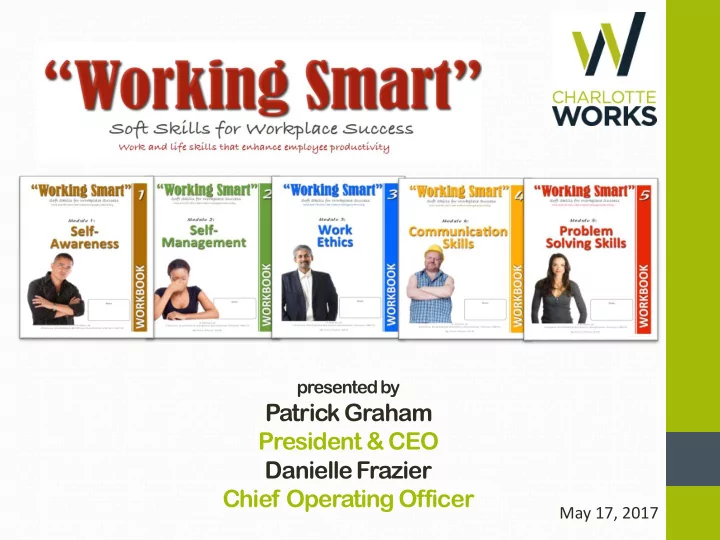

presented by Patrick Graham President & CEO Danielle Frazier Chief Operating Officer May 17, 2017
Soft Skills Gap • In 2010, a group of Charlotte-Mecklenburg workforce development partners sponsored an analysis of the workforce development sector. • 2011 report identified fundamental sector wide issues: • The workforce sector operates in silos working independently; • Weak linkages between the sector and the employer/demand-side of workforce development; • Employment expectations for low-skilled workers are often too low, with entry- level jobs seen as the “end game”; • Individualized needs of job seekers are often not identified, and resources to address them are limited; • The continuum of services for job seekers is not fully developed in Charlotte-Mecklenburg among the partners. • Little sector wide agreement of soft skills best practices
Soft Skills Gap • In 2012, the Charlotte Mecklenburg Workforce Development Partners (CMWDP) was formed to address report recommendations • Partners include: Center for Community Transitions, Charlotte Area Fund, Charlotte Works, Division of College and Career Readiness at Central Piedmont Community College, Career and Technical Education Program of Charlotte-Mecklenburg Schools, Goodwill Industries of the Southern Piedmont, Mecklenburg County Department of Social Services, Economic Services Division, North Carolina Division of Vocational Rehabilitation Services, Urban League of Central Carolinas • Top priority: Soft Skills • CMWDP received a grant to develop the Working Smart soft skills curriculum
Working Smart Development • 2013 • The CMWDP reviewed most recent N.C. Skill Survey (2012) • Employers indicated the need for a workforce with strong soft skills • CMWDP developed and administered follow-up employer survey focusing on soft skills • Conducted focus group with 1,000+ employers • Based on employer feedback, began development of curriculum with assistance from Dr. Steve Parese, national workforce development consultant • 2014 • Endorsed and certified by Charlotte Works and the Partnership • Piloted as Working Smart by five Charlotte-based organizations & Union County collaborative
Working Smart Curriculum • 24 hour curriculum • 5 interactive modules, 16 lessons • Based on cognitive behavioral model • Designed for individuals with multiple barriers to employment • 6 th grade reading level • The curriculum includes, but not limited to: • Personal Branding • Self Change • Dealing With Stress • Personal Reactions • Staying Calm and Clear • Employer Expectations • Active Listening • 4 C’s of Communication • Problems and Goals • Options and Outcomes
Working Smart Impact • Since 2014: • Over 800 individuals Working Smart Certified in Mecklenburg County • Over 15 local community based organizations incorporate it into their programming • Adopted by: • Northeastern WDB, Northwestern WDB and supported by Centralina WDB, Mountain Area WDB, Kerr-Tar WDB, Turning Point WDB, Western Piedmont WDB, Gaston WDB, Southwestern WDB and Regional Partnership WDB • Charlotte-Mecklenburg Schools (k-12) • The NC Community College System (NCCS) • So far over 20 Community Colleges across the state have received training to facilitate Working Smart • Youth Working Smart curriculum launched • Developing an employer pilot program for customized Working Smart training for onboarding process • Working Smart is currently under program evaluation • May 2017, report released
Working Smart’s Impact
Working Smart Impact • Allows job-seekers access to the same employer demanded and high quality training across the state • Builds a highly skilled workforce pipeline for employers throughout North Carolina • Addresses statewide employer needs and gaps in our current workforce • Ensures that key concepts are emphasized in every session
Working Smart: Bridging the Gap • Recent study, released in January 2017, from Boston College, Harvard University, and the University of Michigan found that soft skills training, like communication and problem-solving, boosts productivity and retention by 12 percent and delivers a 250 percent return on investment based on higher productivity and retention. • Deloitte’s 2016 Global Human Capital Trends report, executives now consider soft skills important to fostering employee retention, improving leadership, and building a meaningful culture.
Questions/More Information? Patrick Graham, President & CEO of Charlotte Works704-206-1342 pgraham@charlotteworks.com Danielle Frazier, Chief Operating Officer dfrazier@charlotteworks.com
Recommend
More recommend